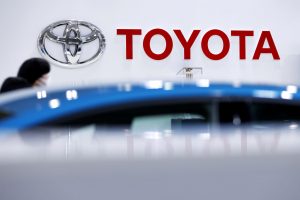Toyota to invest $35 billion into battery-powered EVs and roll out 30 models by 2030

- Toyota, one of the world's largest automakers, is planning to invest 4 trillion yen ($35 billion) to build a full lineup of 30 battery-powered electric vehicles by 2030.
- It aims to increase global sales of battery electric vehicles by 3.5 million units a year by 2030.
- Most of Toyota's current electric vehicle sales are hybrid EVs that are powered by a combination of an internal combustion engine and battery-operated electric motors.
- Battery-only electric vehicles make up a fraction of current sales.
In this article
- 7203.T-JP
Toyota, one of the world's largest automakers, is planning to invest 4 trillion yen ($35 billion) to build a full lineup of 30 battery-powered electric vehicles by 2030.
It aims to also increase global sales of battery electric vehicles by 3.5 million units a year by the end of the decade, CEO Akio Toyoda said Tuesday.
Most of Toyota's current electric vehicle sales are hybrid electric cars that are powered by a combination of an internal combustion engine and battery-operated electric motors. Battery-only EVs make up only a fraction of its current sales.
The Japanese automaker will increase new investments into battery technologies by 500 billion yen ($4.4 billion) to 2 trillion yen, according to Toyoda. It will be part of Toyota's broader 4 trillion yen investment into battery electric vehicles and would include both capital expenditure as well as research and development.
Toyota also plans to invest another 4 trillion yen in other types of electric vehicles, including hybrid cars, plug-in hybrids and fuel-cell electric vehicles, which use hydrogen as a power source.
"In this diversified and unchartered era, it is important to flexibly change the types and quantities of products produced, while keeping an eye on the market trends," Toyoda said during a briefing on the carmaker's battery electric vehicle strategies, according to official translations of his remarks in Japanese.
"We believe that quickly adapting to changes in the future is more important than trying to predict the future, which is nothing but uncertain. We want to keep options available for our customers until the right path is known," he added.
For its luxury brand Lexus, Toyota aims to have battery electric vehicles account for 100% of vehicle sales in Europe, North America, and China by 2030 and globally by 2035.
Despite being one of the pioneers of hybrid models, Toyota has been relatively slow in its push toward battery-only electric vehicles compared to some of its global competitors like General Motors and Ford.
Last month, at the U.N. climate conference in Scotland, the Japanese automaker declined to join a group of six major carmakers, including Sweden's Volvo and Daimler's Mercedes-Benz, to sign a declaration to phase out fossil-fuel cars by 2040, Reuters reported.
A top Toyota executive had reportedly told the news agency that the company does not want to be seen as an electric vehicle maker, but wants to be viewed as a carbon-neutral business instead.
Toyota is aiming for carbon-neutrality at manufacturing plants by 2035, Toyoda said at Tuesday's briefing.
Rival Nissan last month said it will invest 2 trillion yen (around $17.6 billion) over the next five years to speed up the electrification of its product line. It plans to roll out 23 new electrified models by 2030, 15 of which will be fully electric.
Source: Read Full Article
